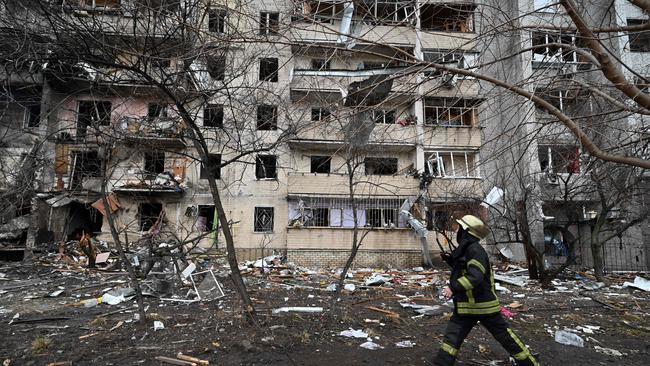Russia’s assault on the international rules-based order
A conflict of this nature will have a significant effect on the global economy and therefore Australia.

A little over a week ago, I joined fellow G20 finance ministers in Jakarta. Confronted by criticism of his country’s aggression towards Ukraine, Russia’s representative denied any wrongdoing, calling on his counterparts to ignore the “fake news”.
Sadly, for 44 million Ukrainians the so-called fake news is now a frightening reality. Hundreds are already dead, thousands more displaced and Russian forces are advancing. It’s a critical moment in world history, Europe’s first major conflict between two nations since the Nazis were defeated.
Let us be clear: Russia has turned its back on the international community and now its actions threaten the rules-based order that has underpinned global prosperity for more than 70 years. At risk is not just the sovereignty of one state but the continuation of a global compact that was agreed in the aftermath of World War II.
The establishment of the UN in 1945, and the International Monetary Fund and World Bank through the Bretton Woods Agreement a year before, has relied on nations abiding by a set of common rules and norms – the spirit of which has been flagrantly breached by Russia’s invasion.
The consequences are real for Russia and the world. Australia has joined with like minds in the US, Britain, Canada, Japan and Europe to impose a series of sanctions on Russian banks, elites and other commercial entities.
Further global actions are being considered, including to prevent Russia and its companies accessing SWIFT, the global payments system. Australia would support this.
Without access, Russia effectively would be cut off from the global financial system by preventing the settlement of cross-border payments. In 2012, similar action was taken against Iran with great effect.
Unlike Europe, which is reliant on Russia for 40 per cent of its gas supplies, Australia has relatively little economic exposure to Russia and Ukraine. In 2020, Australia’s two-way trade with Russia and Ukraine was only about 0.2 per cent of our total trade.
The Australian financial sector has little direct exposure to Russia, either in debt or equity. Nevertheless, a conflict of this nature will have a significant effect on the global economy and therefore Australia.
Equity markets are volatile, with Europe’s stockmarket down 6.9 per cent in the past week.
Food and energy prices are rising, with oil up 6.5 per cent, wheat up 16 per cent and European gas up 54 per cent in the same period. At the same time, Russia’s sharemarket has lost nearly half of its value and its currency has depreciated by more than 10 per cent.
This period of extreme volatility and uncertainty represents a significant headwind for the global economy, just as it was recovering from the pandemic.
Inflation, already at a 40-year high in the US, is likely to rise in the near term, and the IMF has warned of repercussions for the recovery, putting at risk its global growth forecast of 4.4 per cent this year.
The coming days and weeks will be critical as the conflict ensues and the sanctions take effect. But just as there will be long-term consequences from this conflict, there also will be long-term lessons to be learned.
One such lesson is the importance of supply chain resilience in the context of growing geopolitical risk.
Europe’s reliance on Russia’s energy supplies is a case in point. It leaves European countries vulnerable to economic coercion and runs the risk of constraining their actions. Germany’s recent decision to push pause on the certification of Nord Stream 2, a major new gas pipeline with Russia, reflects this concern.
Now more than ever it’s incumbent on liberal democracies the world over to work closely together to strengthen critical supply chains. In doing so, liberal democracies will enhance their economic and national security simultaneously.
After two trying years battling a pandemic, the world now faces a new threat with war in Europe.
The stakes are high, the consequences are real and the impacts are already being felt here at home. It’s a powerful and painful reminder that we cannot take our peace and prosperity for granted.
Josh Frydenberg is the federal Treasurer.



To join the conversation, please log in. Don't have an account? Register
Join the conversation, you are commenting as Logout